Almost every aspiring guitarist wants to get their hands on this aggressive, six-string monster, whether to produce a bone-rattling crunch to go with its blistering tone or create eternal sustain complementing a searing shred.
Unfortunately, the quintessential Les Paul is often beyond the reach of ordinary mortals, with the beast reserved only to the affluent.
It is a good thing some guitar manufacturers now produce Les Paul copy guitars for the masses.
The question is, are they good enough to mimic the snarling fat tone of the classic Gibson Les Paul?
With 15-plus years of experience playing the Les Paul and other guitars with similar styling, electronics, and other features, I am offering my take on the best Gibson Les Paul-style copy guitar.
Of the ten guitars we reviewed, the Epiphone Les Paul Standard ‘60s Electric Guitar tops.
Not only does it look and feel like the original Les Paul, but it also produces the same sounds but without the hefty price tag.
Of course, people have different tastes.
That is why I also included nine other Gibson Les Paul-style copy guitars that are the best in their respective categories.
Let us begin.
Contents
The Best Gibson Les Paul Style Copy Guitars
- Epiphone Les Paul Standard ‘60s
- Epiphone Les Paul Studio LT
- Schecter Guitar Research Solo-II Blackjack
- Epiphone Les Paul SL
- PRS SE 245
- Epiphone Les Paul Custom
- ESP LTD EC-1000
- Epiphone Slash Les Paul Standard
- ESP LTD Eclipse EC-256FM
- Gretsch G5426 Jet Club
Also Great | Editor's Choice | Budget Pick |
Epiphone Les Paul Standard ‘60s
With its vintage looks and phenomenal sound, there is no mistaking the Epiphone Les Paul Standard ‘60s as the best LP-style copy guitar one can buy.
After all, Epiphone is a Gibson subsidiary, making the brand a reliable organization for people who want high-quality but affordable guitars.
This LP copy guitar has a solid mahogany body, topped with an AA flame maple in a spectacular bourbon sunburst color scheme.
Not only does it have an attention-grabbing look, but the sound it produces is as warm and clear as the original LPs of the 1960s.
This electric guitar has a pair of rock-solid ProBucker humbuckers, a three-way pickup switch, and four volume and tone controls for exceptional sound management.
It also comes with a Grover Rotomatic tuning machine and a Tune-O-Matic bridge for tuning stability and limitless sustain.
The SlimTaper ‘60s C mahogany neck features an Indian laurel fingerboard with a 24.95-inch scale length and 1.693-inch nut width.
This Les Paul might not have the handiwork of Gibson craftsmen, but it looks and sounds like the real thing.
Pros
- Gorgeous vintage look
- Harmonically rich, warm, and resonant tone
- Rock-solid pickups
- Stable tuning
- Exceptional craftsmanship
Cons
- Might have some quality issues
Epiphone Les Paul Studio LT
There is no denying the beautiful sounds and stunning looks of the Epiphone Les Paul Studio LT, offering exceptional value to any guitarist.
It has classic controls, swagger, and tone people love about Les Pauls, but at an insanely low price.
You get a solid mahogany body and neck for exceptional sustain, complete with rosewood fingerboard accommodating its 22 medium-jumbo frets along the 24.75-inch fretboard.
Although it has a bolt-on neck instead of a set-neck design, this LP copy guitar still beats higher-priced instruments in stability, durability, and strength.
Precision and stable tuning is a cinch with the guitar’s Tune-O-Matic bridge and die-cast tuning machines, ensuring you get the perfect tune all the time.
The tone and volume controls work splendidly with its dual Zebra ceramic humbuckers, making it a breeze to tweak and achieve preferred tonal qualities.
The Studio LT is an affordable Les Paul but with a rock star attitude.
Pros
- Classic silhouette
- Limitless sustain
- Precise and stable tuning
- Reliable controls
- Insane value
Cons
- Some people might be put off with the guitar’s ceramic humbuckers
Schecter Guitar Research Solo-II Blackjack
The Schecter Research Solo II Blackjack is perfect for anyone ready to splurge on a Les Paul-like guitar but not a Gibson badge.
This streamlined electric guitar not only wows the crowd with its killer appointments and spotlight-worthy finish but also its phenomenal sound and smooth response.
Ready to take the heavy metal genre by storm, this LP-style copy guitar has a pair of Lundgren M6 humbuckers that produce a crisp and punchy tone.
The pickups have excellent articulation, heavy midrange focus, clear tones, and sufficient low-ends for a metal performance like no other.
It has the classic LP scale length set on a 1.653-inch 12”-16” compound mahogany neck, ready for aspiring shredders.
The Schecter locking tuners and Tune-O-Matic bridge give the guitar excellent tuning stability while aiding in its exceptional sustain.
Heavy metal fans can easily bask in the limelight with this axe.
Pros
- Stunning looks with killer appointments
- Punchy and crisp tone
- Shred-friendly neck design
- Smooth response and endless sustain
- Stable tuning
Cons
- The price
Epiphone Les Paul SL
Just because this Les Paul copy guitar has the friendliest price in this list does not mean one should disregard it as a complete bust.
The Epiphone Les Paul SL is one of the most affordable LP-like electric guitars on the market, making the perfect choice of beginner blues and rock musicians.
It features a pair of ceramic single-coil pickups that deliver the classic Les Paul tone of the 1950s – warm and clear with enough sustain for an electrifying performance.
It has a poplar body and a solid mahogany neck, aiding in the guitar’s commendable sustain.
The guitar also has rosewood forming the foundation of its 22-fret, 24.75-inch scale length fingerboard.
It comes with a master tone and volume control knob, allowing novice guitars to discover an extensive range of tonal qualities for a beginner electric guitar.
Pros
- Ideal for rock and blues
- Perfect for beginners and intermediate guitarists
- Warm and clear tone
- Easy-to-tweak controls
- Classic Les Paul look, vibe, and feel
Cons
- Poplar body not as good-sounding as other tonewoods
PRS SE 245
Guitarists who love the vintage rocking sound of a 1950’s Les Paul should consider getting the PRS SE 245.
This musical instrument has everything you expect from a Paul Reed Smith guitar and a Les Paul’s classic silhouette and tone.
It might have a more subtle appearance than other LP copy guitars on the market, but there is nothing restrained in its performance.
A pair of fat-tone humbuckers give this mahogany solid-body electric guitar exceptional high-gain, sustain, and punchy tones.
You could be playing the blues one moment and rocking metal the next with a simple flick of a switch.
The tuning machines, tailpiece, and bridge work together to stabilize tuning, making it as dependable as anyone can imagine.
The string action stays stealthy atop its 24.5-inch rosewood fingerboard, perfect for guitarists who want to hone their fingerstyle skills.
Pros
- Vintage style with modern appointments
- Crunchy and punchy, high-gain tones
- Exceptional sustain
- Dependable and stable hardware
- Good string action
Cons
- Plastic nut
Epiphone Les Paul Custom
No less than Lester William ‘Les Paul’ Polsfuss asked Gibson to recreate his signature model, introducing the Les Paul custom to the music-loving world.
The Epiphone Les Paul Custom is the brand’s tribute to Les Paul’s classic instrument, complete with decadent binding, ebony fingerboard, an all-mahogany construction, and intricate inlay work.
It has a LockTone ABR bridge, Grover tuning machines, and a pair of ProBucker humbuckers that mimic the legendary PAF pickups of the iconic LP Custom.
The hardware and electronics combo gives this LP copy guitar a clear response, exceptional sustain, and a well-balanced and rich tone.
While some folks might prefer a rosewood fretboard, the guitar’s ebony surface gives it optimum comfort and outstanding playability.
Who needs a signature Gibson LP Custom when one can get the Epiphone version for a fraction of the price?
Pros
- Classic Les Paul styling
- Excellent tonewood combination
- Punchy tones and clear response
- Well-balanced, fat, and rich tone
- Exceptional playability
Cons
- Some people might prefer rosewood fretboard
ESP LTD EC-1000
While ESP is not under the Gibson umbrella, it still makes fantastic Les Paul-style copy guitars.
One of the brand’s most iconic offerings is the ESP LTD EC-1000, designed especially for seasoned shredders and aspiring grunge rockers.
With its super-thin (1.65-inch) Thin-U mahogany neck with 24 extra-jumbo frets and a 13.7-inch radius, the EC-1000 is a fast-playing guitar.
Not only is the neck ultra-sleek for shredding, its solid mahogany body and EMG humbuckers also give it a rock concert-ready performance.
You can think of limitless sustain and aggressive and high-gain tone.
It also has a locking bridge for reliable intonation and tuning stability while complementing mahogany’s resonance and sustain.
Although this electric guitar has many modern features, it remains loyal to the classic look of a 1960’s Les Paul.
It can produce clean sounds as effortlessly as it does with mean and aggressive tones.
Pros
- Ultra-fast neck for shredding
- All-mahogany construction
- Endless sustain, high-gain performance
- Stable and dependable tuning
- Classic look
Cons
- Price
Epiphone Slash Les Paul Standard
Fans of Gun’s ‘N Roses lead guitarist, Slash, will love the Epiphone Slash Les Paul Standard.
This copy guitar has all the fine elements of a classic LP Standard with Slash’s signature customizations, making it an excellent choice for aspiring rock stars.
Playing scorched-earth and bluesy licks is a cinch with this LP copy guitar because of its thoughtful combination of tonewood, electronics, and hardware.
Like all Les Pauls, this guitar has a mahogany body for incredible sustain and warmth.
It also has custom ProBucker pickups that deliver PAF-like tones reminiscent of classic Les Pauls.
The C-shaped neck allows for unbelievable playability, while the CTS potentiometers guarantee spot-on warm and clear vintage tones.
This copy guitar has color-coordinated hardware, complementing its iconic silhouette and head-turning looks.
It is the perfect electric axe for aspiring rock stars, touring the country, and wowing the crowd with incredible sounds.
Pros
- Custom design and appointments
- Unbelievable playability
- Spot-on vintage Les Paul tone
- PAF-like humbuckers
- Head-turning aesthetics
Cons
- Indian laurel fingerboard, not rosewood
ESP LTD Eclipse EC-256FM
Many Gibson Les Paul-style copy guitars only feature either a humbucker or single-coil pickup but never both.
While the ESP LTD Eclipse EC-256FM is essentially a humbucker-fed guitar, it has an ingenious technology that splits its double-coil humbucking pickups into two single-coils.
You get an LP-style guitar with a versatile tone, ready to rock the concert stage or make for a pleasant solo in your home studio.
Many guitarists love this LP-style guitar because of its vintage look, exceptional sound, versatile tonal characteristics, and fast-playing neck.
Fretting is never an issue with its Thin-U rosewood neck, 22 jumbo frets, and 1.653-inch nut width.
Stabilizing its tuning and ensuring its intonation is also never worrisome because of its TOM bridge, LTD tuners, and LP-worthy angled headstock.
This Les Paul-style guitar has modern appointments in a vintage silhouette, ready for the performance of your life.
Pros
- Ingenious coil-splitter
- Flexible, resonant, and warm tone
- Fast-playing neck
- Vintage look
- Good value
Cons
- Coil-splitting technology requires a bit of a learning curve
Gretsch G5426 Jet Club
The Gretsch G5426 Jet Club is a solid-body electric guitar that features the classic Les Paul silhouette with a serious pair of Gretsch humbuckers for playing heavy metal songs.
Like the iconic Les Paul’s mahogany construction, this copy guitar has equally resonant basswood.
The advantage is its extra bite and crisp treble, perfect for grunge rock and glam metal sounds.
Its 12-inch neck radius and super-sized medium-jumbo frets also enable guitarists to play with lightning speeds.
The guitar has smoky tones and organic resonance one can easily turn into a biting sound with a flip of a switch and a turn of the knob.
Surprisingly, you get an exceptional Les Paul-style guitar without the hefty price tag.
Pros
- Clear and warm tone
- Simple aesthetics but feature-rich
- Good resonance
- Lightweight
- Affordable
Cons
- Inconsistent tuners
What to Remember about Gibson Les Paul-Style Copy Guitars
Buying a Gibson Les Paul-style copy guitar requires understanding what makes a Les Paul electric guitar a Les Paul.
You can use this knowledge as a baseline for choosing the LP copy guitar you want to buy.
It is worth remembering that the more identical the copy guitar’s characteristics to the original Les Paul, the better is the musical instrument.
Original Gibson Les Paul Electric Guitar Design Features
Learning about what makes a Les Paul a Les Paul can help you determine the best LP copy guitar to get.
Tonewood
While other guitars use maple, the LP features only a solid mahogany body with its characteristic deep resonance.
The fingerboard is always rosewood, favored for its rich sound and smooth texture, giving the musical instrument outstanding playability.
Scale Length
Most electric guitars have a scale length of 25.5 inches, while the Gibson LP is shorter by about 0.75 inches.
The LP’s short scale length improves the guitar’s playability while giving its tone a warmer vibe than guitars with long scale lengths.
Guitarists love the LP because it allows more effortless bends.
Pickups
The Gibson LPs of the 1950s and early 1960s featured the P90 single-coil pickup the brand introduced in 1946.
The P90 delivers a warm tone and high-range frequencies but less brightness and edge than other single-coil pickups.
Some copy guitars still use the P90 pickup system, although most brands now feature a humbucker system to eliminate the annoying fret buzz omnipresent in single-coil systems.
Humbucker pickups offer a rich and deep tone, mimicking the sound of the classic LP.
Neck
Another Les Paul differentiating feature is its neck construction.
Most guitars have a bolt-on neck construction, while the Gibson Les Paul has a set-neck design.
The set guitar neck allows vibrations to move along the guitar length, enabling the Gibson Les Paul to produce limitless sustain.
Headstock
The Gibson Les Paul also featured an angled headstock, contributing to its excellent sustain.
The angling transfers string pressure onto the nut, minimizing vibration loss and improving sustain.
The design also secures the strings in place, perfect for guitarists who want to play Gilmour-like bends.
Controls
Seasoned guitarists love experimenting with the Gibson LP’s controls to produce different tones best suited for their playing style and music genre.
In general, LPs have two volume and tone controls for the neck and bridge, bringing the total to four.
You can play smooth jazz and soulful R&B or hit it big with screeching rock and metal sounds with a simple tweak of these controls.
Pickup Selector
Original Les Paul electric guitars almost always feature two pickups, one at the bridge and another at the neck.
Hence, these guitars have a three-way pickup switch for toggling between the neck pickup, bridge pickup, and both.
FAQs
Are Les Paul copy guitars good?
Everything depends on how far the guitar manufacturer wants to add as many original Les Paul elements into the copy.
Some manufacturers only design their Les Paul copy guitars to mimic the original Gibson’s form factor.
Other brands use precisely the same components.
The closer the copy guitar resembles the original Les Paul, the better is its sound quality, tonal characteristics, and playability.
What is a Gibson Les Paul-style copy guitar?
A Gibson Les Paul-style copy guitar is a musical instrument with all or most of the characteristics of the original Gibson except the manufacturer and the hefty price tag.
Many Les Paul copy manufacturers are outside the United States, allowing them to produce the guitars with similar but less expensive materials and employing cheaper labor.
Why are Gibson Les Paul guitars expensive?
The principal reason why original Gibson Les Paul guitars are expensive is their origin – proudly US-made.
Although the 1894-established, Michigan-based guitar company has manufacturing facilities in Memphis, Bozeman, and Nashville, it is the latter plant that churns out the Les Paul guitar line.
The implications are immense.
US-made Les Pauls must adhere to strict regulations about tonewoods, pay their craftsmen more because of labor laws, and produce only a limited number of guitars because of restrictions on nitrocellulose use as a finishing touch.
You must also factor in the electronics, a long list of legendary musicians, a Plek machine, and craftsmanship by hand, and it is easy to see why Gibson Les Paul guitars command a four-digit price tag.
What are the tonewood Gibson Les Paul copy guitars?
As mentioned, the body and neck should be mahogany and the fretboard rosewood, although it is not unusual to find copy guitars with other tonewoods.
For example, some manufacturers might use ebony or Indian laurel for the fingerboard, maple for the neck, and basswood for the body.
It would be best to check these tonewoods’ sound characteristics to determine if they suit your playing style.
How about the pickup system?
Most Gibson LP copy guitars have humbuckers because of their exceptional ability to negate feedback.
However, some brands also provide the classic P90 or other single-coil pickup systems to bring the guitar’s tonal characteristics as close to the original LP as possible.
An excellent choice is an Alnico pickup system because of its warm and well-balanced sound.
If you want low-mid range tones, you might want to go for ceramic pickups.
What tuning machines are favored by Gibson?
Gibson favored Grover tuners for its Les Paul-series electric guitars.
It would be best to check the Gibson Les Paul copy guitar if it also has Grover tuning machine heads.
These tuners have permanent lubrication, allowing them to retain their tuning for extended periods.
Some Gibson LP copy guitars might feature other tuning machine systems.
It would be best if the tuners were lockable to ensure tuning stability.
Conclusion
The best Gibson Les Paul-style copy guitars reflect everything good about the legendary music monster without its prohibitive price tag.
The Epiphone Les Paul Standard ’60s is the best among the ten electric guitars we reviewed.
Being a Gibson subsidiary, Epiphone did an outstanding job of recreating a classical masterpiece perfect for everyone who wants exceptional sound qualities, unparalleled performance, and an iconic silhouette without breaking the bank.
You can buy this Les Paul copy guitar from Sweetwater and other popular e-commerce stores.
You might also want to check out your favorite local music shop for this venerable musical instrument.
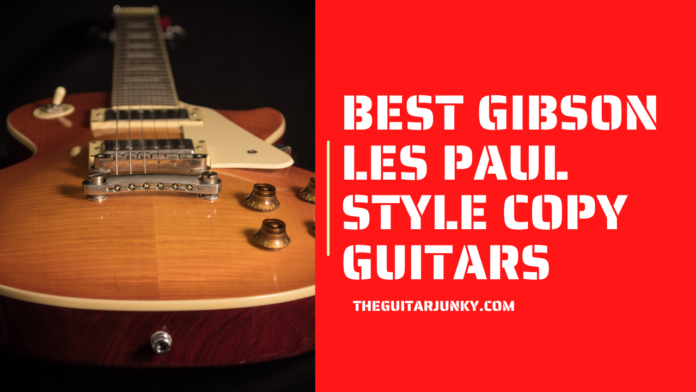
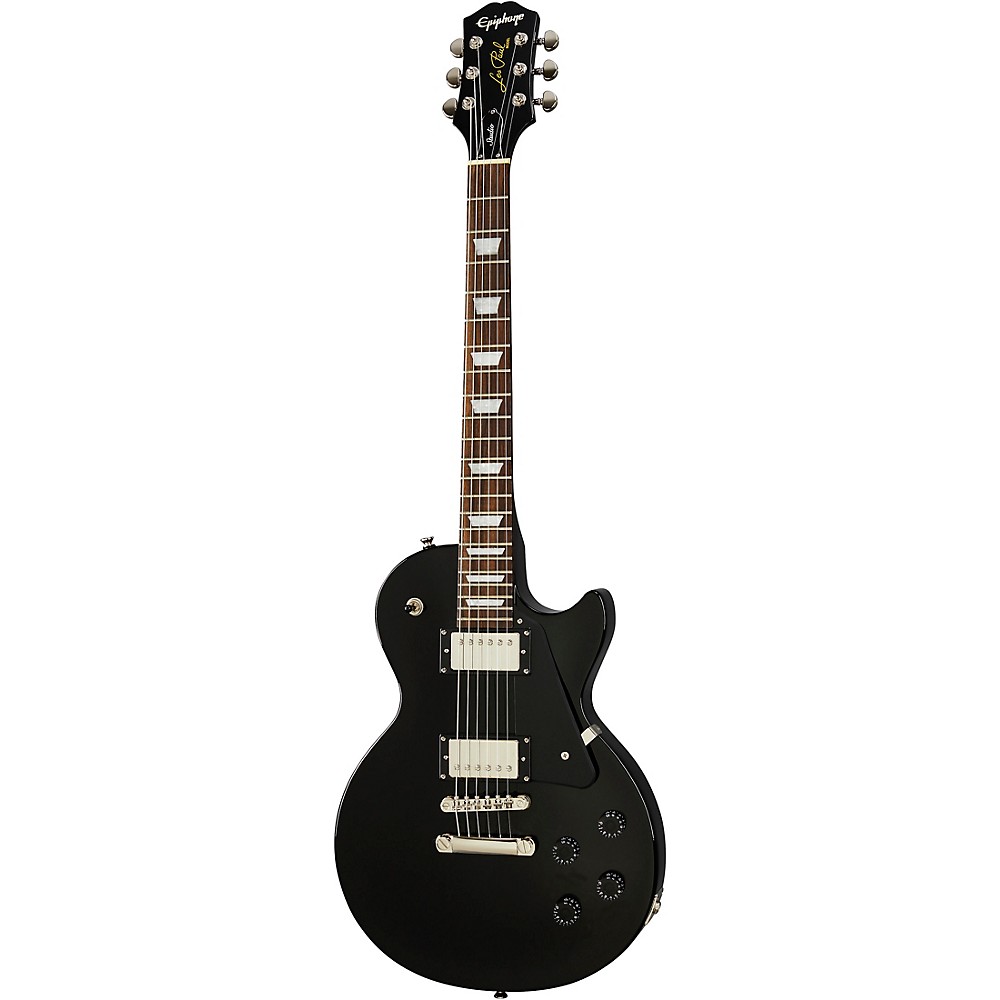
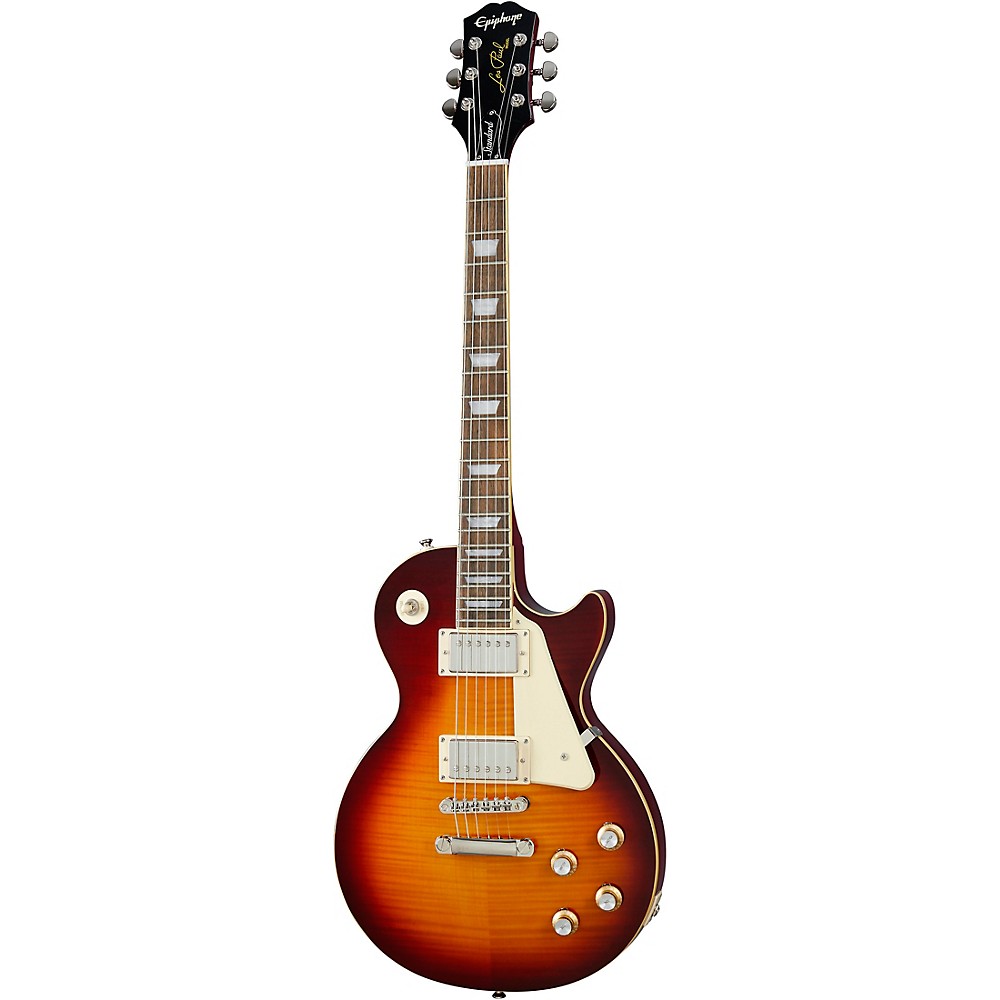
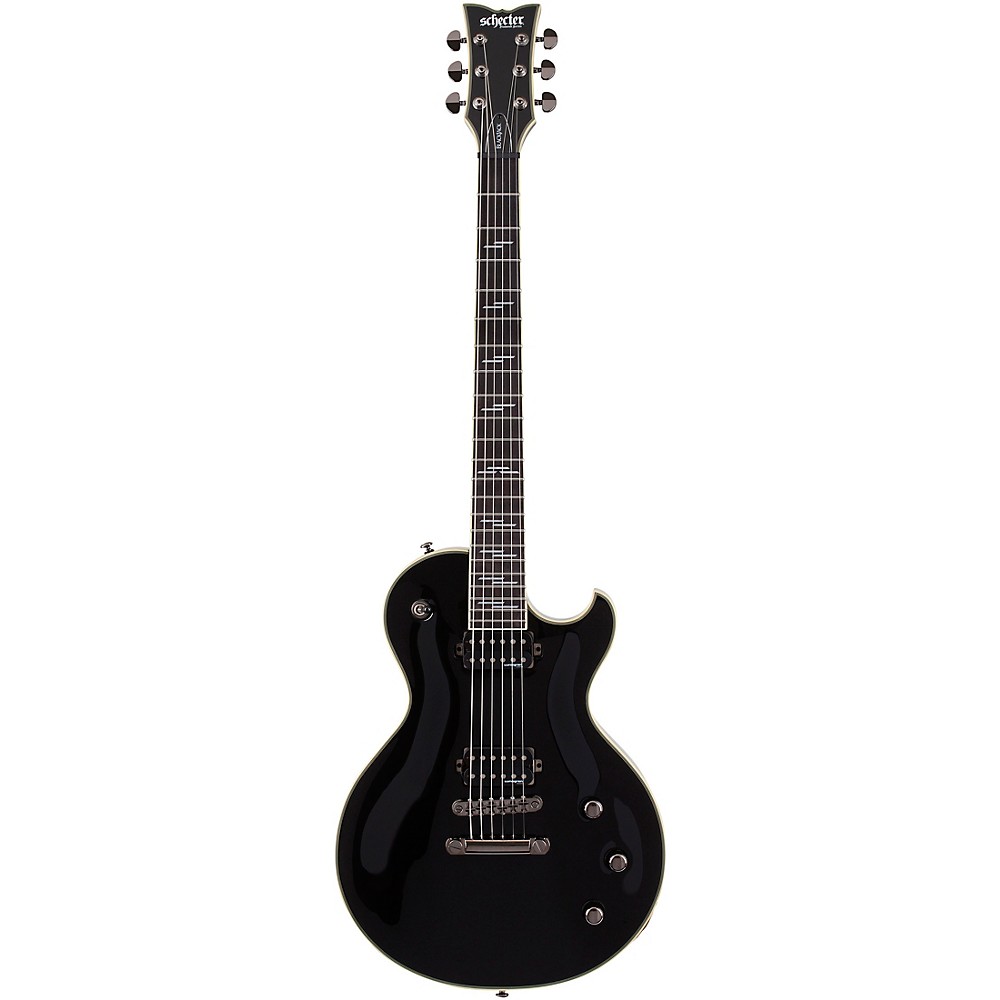

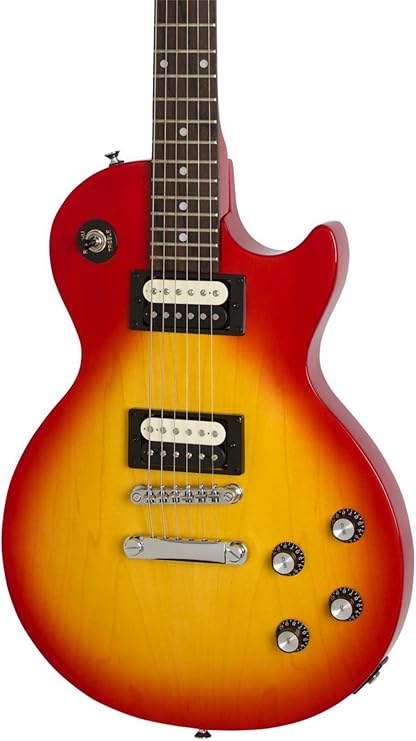








I just bought my second Epiphone Les Paul SL this week. It’s solid for beginners. But.a pro to add to your list is that it’s a solid platform to mod it to your heart’s desire. My black one I got initially got the full treatment and I had a total landed cost including mod upgrades. of right at $200. It transformed into a $400-$500 axe quality wise.
Mods were as follows:
– Upgraded semi-open tuning machines.
– Graphtech Tusq XL Nut. (Wow…just Wow)
– Copper shielding tape in the cavity
– New wrap around bridge piece with individual adjustable saddles for intonation.
– Max grip speed knobs
– Selector switch indicator ring
– 500k Audio Short Shaft CTS Pot for the tone position
– Wilkinson P-90 Pick ups. Required some minor additional routing to the body and pick guard. This neck position P-90 far exceeds any expectation. It’s the kind of tone that makes your guitar very hard to set down. The bridge pick-up is serviceable, but it’s out shined by the neck pick up.
Final verdict is that the time, effort, and added component cost was well worth it. The end result is one that we’re extremely proud of. .In the hunt / chase of the Almighty tone, the good guys won this round with the Black SL.
Which brings me to my new teal Les Paul SL. Myself and a friend are still in the planning stages but will start on it very soon. It’s pictures can’t capture how beautiful that teal is in person. We’ve pondered everything from a P-90 neck with a humbucking bridge to a pair of hot rail Humbuckers single coil sized with a pair of push / pull pots. The only thing certain is the white pick guard will be replaced with black.
Again it’s a wonderful beginner guitar as is. But I’m no beginner and I know a great / affordable and blank platform when I see it. One that leaves wide open pretty much any possibility you can think of. The SL’s the low list price won’t have you wincing if you must expand the routing. So get one and have fun with it. Go as wild as you wish, or mod your way to your dream guitar. And wow is the process a good experience. Couldn’t be happier.